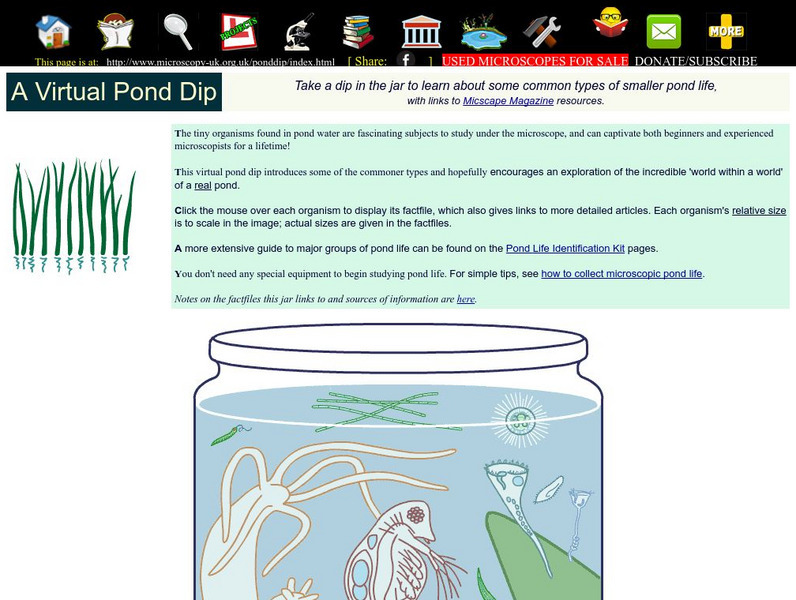Chem4kids
Chem4 Kids: Symbols in Chemical Equations
Chem4Kids! provides an overview of the symbols representing numerical values in chemical equations. Each symbol is defined and described.
PBS
Pbs Kids: Science Rocks: Air Lift
Through this experiment, students are challenged to lift a book (and other items) with just air. Requires simple household items, gallon-size, zipper-lock plastic bag, book, pencil, drinking straw, and tape.
PBS
Pbs Kids: Design Squad: Build: Hack a Greeting Card
Transform an old musical greeting card into a surprise for your friend.
PBS
Pbs Kids: Design Squad: Build: Build a Better Lunchbox
Follow the directions to build a lunchbox that will keep a frozen treat from melting.
PBS
Pbs Kids: Design Squad: Build: Unpoppable Balloon
Can you run a stick through a balloon without popping it? See if you can make this un-poppable ballon?
Microscopy UK
Microscopy Uk: A Virtual Pond Dip
In this site, you will be introduced to some of the more common organisms found in a pond. Contains a thorough guide to small and microscopic pond life with links to other descriptive sources.
PBS
Pbs Kids: Don't Buy It: Get Media Smart!: Buying Smart
Play a Price is Right style game and learn about merchandising. You will also find lots of information about advertising, brand names, and product value.
Scholastic
Scholastic: The Underground Railroad: Escape From Slavery
Imagine being a slave escaping from the South in 1860, and heading to freedom through the underground railroad. Students will hear from first-person accounts and investigate other primary sources from the 1800s.
US Department of Energy
Need Project: Solar Oven [Pdf]
An introduction and activity to engage students in building a solar oven.
University of Victoria (Canada)
Study Zone: Forming the Simple Past Tense (Regular Verbs)
Students type the past tense of verbs in parentheses into the boxes provided throughout the paragraph and then check answers.
TES Global
Tes: Scheme of Work: The Tempest by William Shakespeare
[Free Registration/Login Required] During these multi-day lessons, students will closely read William Shakespeare's work, The Tempest. Students will analyze characters, plot, and themes. Students will culminate their understanding...
TES Global
Tes: Nouns: Revision: Explanation Booklet
[Free Registration/Login Required] This seven-page resource provides definitions for different categories of nouns: common, proper, collective, hyphenated, compound, and abstract. Numerous examples with pictures are provided for each...
Study Languages
Study Spanish: Present Perfect
A straightforward explanation of how the present perfect tense is formed with a printer-friendly page that is great for note keeping. One free online quiz and test evaluate mastery.
NASA
Nasa Space Place: All About Mercury
Students have an opportunity to learn more about Mercury. Each badge contains a student centered experience to understand another aspect of the planet.
Chem4kids
Chem4 Kids: Liquids
This overview of liquids explores what a liquid is and how matter becomes changes into a liquid.
Other
New York State Education Department: Eighth Grade Math, Book Three (2006) [Pdf]
Part three of three; The March 2006 8th grade Math test from the State of New York. The test is 12 open-response questions dealing with topics such as algebra (solve for a variable, write function rules), geometry (translations, parallel...
Annenberg Foundation
Annenberg Learner: Patterns in Mathematics: How Many Valentines?
Students look for patterns to determine how many valentines will be distributed in a class of 28 students. After trying the problem, they can look at several other methods that could be used and compare the answer they got. There is also...
Lin and Don Donn
Mrdonn.org: Daily Life in Olden Times: Southeast Cherokee Indians
Lesson and resources on the history of the Cherokee Indian tribe.
Other
Rabbit Anatomy
Click on the picture of the rabbit and learn about the various parts of the rabbit and their functionality. Other interesting facts about rabbits are presented on this page.
OER Commons
Oer Commons: Understanding Distance & Coordinates
Seventh graders find the distance between points on a number line by counting and by using subtraction. They then use subtraction to find differences in temperatures. Students discover that the distance between any two points on the...
PBS
Pbs Learning Media: Rosa Parks: Civil Rights Activist
Through two primary source activities and a short video, students will learn about Parks' lifelong commitment to the Civil Rights Movement.
PBS
Pbs Learning Media: Sojourner Truth: Abolitionist and Women's Rights Activist
Through two primary source activities and a short biographical video, students will understand the remarkable career of this persevering woman who lived up to her self-chosen name.
PBS
Pbs Learning Media: Henry David Thoreau: Author, Philosopher, and Abolitionist
By watching a short video and engaging in two primary source activities, students will explore the philosophy, writings, and impact of Henry David Thoreau.
Children's Museum
The Children's Museum of Indianapolis: Dna the Ladder of Life
Students create a DNA model to illustrate how the four DNA bases are like a blueprint for each living thing.










![Need Project: Solar Oven [Pdf] Lesson Plan Need Project: Solar Oven [Pdf] Lesson Plan](https://d15y2dacu3jp90.cloudfront.net/images/attachment_defaults/resource/large/FPO-knovation.png)






